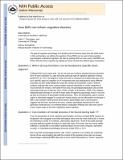How fMRI Can Inform Cognitive Theories
Author(s)
Kanwisher, Nancy; Mather, Mara; Cacioppo, John T.
DownloadKanwisher_How fMRI can inform.pdf (37.75Kb)
OPEN_ACCESS_POLICY
Open Access Policy
Creative Commons Attribution-Noncommercial-Share Alike
Terms of use
Metadata
Show full item recordAbstract
How can functional magnetic resonance imaging (fMRI) advance cognitive theory? Some have argued that fMRI can do little beyond localizing brain regions that carry out certain cognitive functions (and may not even be able to do that). However, in this article, we argue that fMRI can inform theories of cognition by helping to answer at least four distinct kinds of questions. Which mental functions are performed in brain regions specialized for just that function (and which are performed in more general-purpose brain machinery)? When fMRI markers of a particular Mental Process X are found, is Mental Process X engaged when people perform Task Y? How distinct are the representations of different stimulus classes? Do specific pairs of tasks engage common or distinct processing mechanisms? Thus, fMRI data can be used to address theoretical debates that have nothing to do with where in the brain a particular process is carried out.
Date issued
2013-01Department
Massachusetts Institute of Technology. Department of Brain and Cognitive SciencesJournal
Perspectives on Psychological Science
Publisher
Sage Publications
Citation
Mather, M., J. T. Cacioppo, and N. Kanwisher. “How fMRI Can Inform Cognitive Theories.” Perspectives on Psychological Science 8, no. 1 (January 1, 2013): 108–113.
Version: Author's final manuscript
ISSN
1745-6916
1745-6924